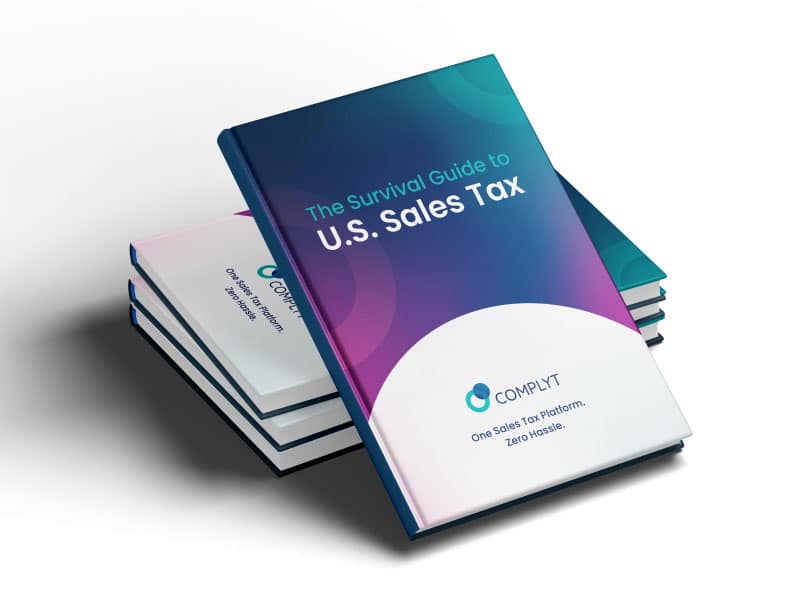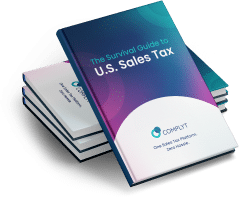What is the Sales Tax Rate in Washington DC?
When it comes to sales tax in Washington DC, understanding the applicable rates is fundamental.
As of 2023, Washington DC imposes a sales tax of 6% on the sale of all tangible personal property and some service. That’s where the compliance journey begins.
However, it’s crucial to note that DC has various tax rates for different categories of goods and services, such as liquor sold for off-premise and on-premise consumption, rental vehicles, parking in commercial lost, and transient accommodations. So be sure to confirm the tax rate applicable to your product on the Washington DC Department of Revenue website.
Luckily, unlike other states, there are no local sales tax rates and regulations that apply within Washington DC.
When Should You Collect Sales Tax in Washington DC?
Determining when to collect sales tax in Washington DC is pivotal for businesses operating within the district … whether physically or remotely.
Your business should start collecting sales tax as soon as it establishes a nexus within the district. A nexus can be physical or economic, and it triggers the obligation to collect and remit sales tax.
Be aware of changes in local tax rates and regularly check for any modifications in Washington DC’s tax regulations.
Sales Tax Physical Nexus Checklist for District of Columbia
Understanding the physical nexus in DC is essential for businesses to navigate the sales tax landscape effectively. Here’s a checklist to determine if your business has a physical nexus in the District of Columbia:
- Storefronts or Offices: If your business operates a physical store, office, or establishment in DC that has sales tax, you have a physical nexus.
- Employees or Representatives: Having employees, agents, or representatives operating in DC establishes a nexus. This is crucial for companies with remote employees.
- Warehouses or Inventory: If you store goods in a warehouse within a sales-tax-collecting jurisdiction, even temporarily, you may have a nexus.
- Affiliates: Engaging with a partner or affiliate based in DC could create a nexus.
It’s crucial for businesses to stay updated on local regulations, as these can change and impact whether you have a nexus in the District of Columbia.
District of Columbia Economic Nexus Threshold: Revenue, Thresholds, and Transactions
As of 2018, Washington DC imposes economic nexus laws that require out-of-state businesses to collect and remit sales tax within DC as soon as they meet the district’s economic nexus thresholds.
The economic nexus threshold in the District of Columbia is currently $100,000 in gross revenue or 200 separate transactions in the current or previous calendar year.
Businesses surpassing these thresholds are required to collect and remit sales tax in the District of Columbia.
District of Columbia Sales Tax on Products: How to Calculate What Your Business Should be Charging
With the lack of local-level sales tax jurisdictions, calculating sales tax in Washington DC is a rather straightforward matter.
With a statewide tax rate of 6%, the calculation is pretty simple. For example, a clothing item of $100 incur a 6% Washington DC clothing sales tax surcharge no matter where you are in the district.
Businesses who provide services and sell food & beverage products need to confirm their taxability and applicable sales tax rates in the Washington DC department of Revenue website to ensure they make their sales tax calculations based on the correct rates.
Which Services are Taxable in the District of Columbia?
Services are generally exempt from sales tax in the District of Columbia, but there are exemptions. It is thus critical for businesses to consult the local tax codes or work with a tax advisor familiar with the unique tax landscape of the District of Columbia to ensure compliance.
District of Columbia Online Sales Tax – Are SaaS and Digital Services Taxable?
Washington DC takes a rather no-fuss approach to digital and electronic products and services and taxes most digital products and services as tangible property at the 6% rate.
As such, media streaming services and items such as eBooks are both taxable in DC.
And even though software-as-a-service (SaaS) often falls in the gray when it comes to the product/service’s legal definition, Washington DC does require businesses operating in the District of Columbia to charge sales tax on their transactions regardless of frequency.
Does my Business Need to Charge Sales Tax for SaaS in Washington DC?
Yes, your business should charge SaaS sales tax in the District of Columbia. SaaS is considered a sale of property and the provision of service in most DC jurisdictions. As such, DC SaaS sales tax comes into play, generally applied at the general sales tax rate.
How can a Business Obtain a Sales Tax Permit in District of Columbia?
If your business operates within Washington DC and has triggered a nexus within the jurisdiction, obtaining a sales tax permit is unavoidable.
Here’s how you can get a sales tax permit in the District of Columbia:
- Businesses with Physical Nexus: Apply for a sales tax permit directly with the District of Columbia Office of Tax and Revenue’s Tax Division.
- Remote Sellers: eCommerce and other remote businesses with an economic nexus must register for a sales tax permit online through the District of Columbia Remote Sellers Sales Tax Commission. Sellers can visit the Commission’s FAQ webpage for more assistance or get in touch with the Commission directly.
Collecting Sales Tax in District of Columbia as a Business
Once you’ve determined that you have a nexus in a sales-tax-collecting jurisdiction in D.C., follow these steps:
- Maintain Detailed Records: Track all transactions, collected taxes, and exemptions.
- Stay Updated on Rate Changes: Regularly check for updates on sales tax rates within the jurisdictions you operate.
- File & Remit on Time: Each jurisdiction will have its due dates and filing procedures. Ensure timely filing and payment to avoid penalties.
It’s essential to work with a local tax expert or utilize specialized sales tax software to ease the complexity of collecting and remitting sales tax in the District of Columbia.


